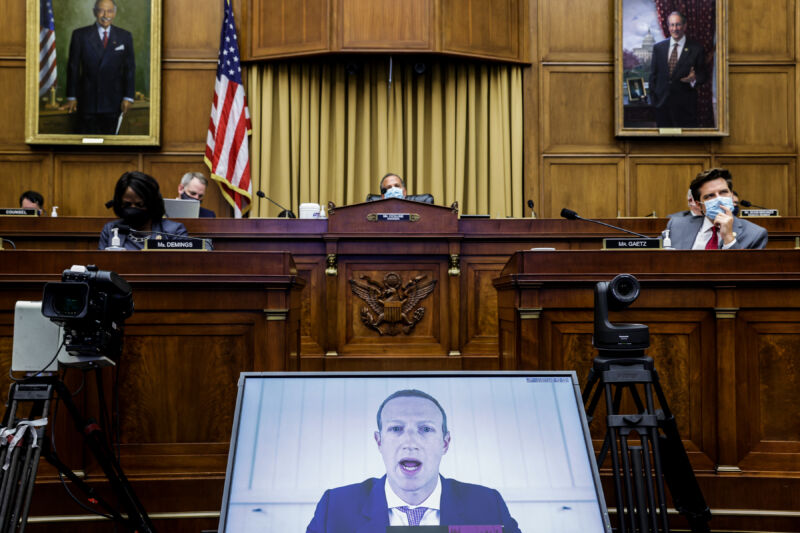
In a 2012 email six weeks before acquiring Instagram, Facebook CEO Mark Zuckerberg wrote that one of his motivations for the acquisition was to "neutralize a potential competitor." The emails were revealed during today's hearing before the House antitrust committee featuring four technology moguls: Tim Cook, Sundar Pichai, Jeff Bezos, and Zuckerberg. The emails were first reported by the Verge.
Facebook was one of the Internet's biggest social networks in 2012, but its dominant position was not as secure then as it is today. There were a lot of rival social networks, and Zuckerberg worried his company would get caught flat-footed by the shift to smartphones.
Neutralizing a potential competitor?
On the evening of February 27, 2012, Zuckerberg emailed Facebook Chief Financial Officer David Ebersman about the possibility of acquiring "mobile app companies like Instagram and Path that are building networks that are competitive with our own." He worried that "if they grow to a large scale they could be very disruptive to us."
In a reply the next morning, Ebersman encouraged Zuckerberg to make sure he had a good reason for making an acquisition. He suggested three possible reasons to do a deal: "1) neutralize a potential competitor," "2) acquire talent," and "3) integrate their products with ours in order to improve our service." Ebersman argued that the first reason was a "bad reason" because "someone else will spring up immediately in their place."
Zuckerberg replied within 20 minutes. "It's a combination of (1) and (3)," he wrote. Then he spelled out his thinking:
One thing that may make (1) more reasonable here is that there are network effects around social products and a finite number of different social mechanics to invent. Once someone wins at a specific mechanic, it's difficult for others to supplant them without doing something different. It's possible someone beats Instagram by building something that is better to the point that they get network migration, but this is harder as long as Instagram keeps running as a product. (3) is also a factor but in reality we already know these companies' social dynamics and will integrate them over the next 12-24 months anyway.
Zuckerberg added that another way to look at the acquisition strategy is as a way of "buying time." "Even if some new competitors springs up, buying Instagram, Path, Foursquare, etc. now will give us a year or more to integrate their dynamics before anyone can get to their scale again," he argued. New products "won't get as much traction" once Facebook has replicated their social mechanics, Zuckerberg predicted.
Evidently, Zuckerberg soon realized how bad this email could look if it eventually became public. Less than an hour later, he sent Ebersman another email.
"I didn't mean to imply that we'd be buying them to prevent them from competing with us in any way," Zuck wrote. "Buying them would give us the people and time to incorporate their innovations into our core products, which is how we'd do the integration rather than actually combining the products. I'm mostly excited about what the companies could do together if we worked to build what they've invented into more people's experiences."
“Instagram can hurt us”
In an April email, Zuckerberg wrote that "Instagram can hurt us meaningfully without becoming a huge business."
Days later, Facebook bought Instagram in a deal worth $1 billion. In an email exchange the day of the acquisition, Zuckerberg and a Facebook engineer discussed the relative importance of Instagram and Google+, Google's social network.
"I remember your internal post about how Instagram was our threat and not Google+," Zuckerberg wrote. "You were basically right. One thing about startups though is you can often acquire them."
The deal sailed through a review from the Federal Trade Commission. Instagram was a small company with just 13 employees; it probably wasn't obvious to regulators that it would grow to become one of the Internet's largest social networks.
Now the deal is getting more scrutiny. House Democrats highlighted the emails during Wednesday's hearing as they grilled Zuckerberg about the transaction.
"I've been clear that Instagram was a competitor in the space of mobile photo sharing," Zuckerberg said during the hearing. "There were a lot of others at the time. They competed with apps like VSCO Cam and PicPlz and companies like Path. It was a subset of the overall space of connecting that we exist in."
reader comments
124